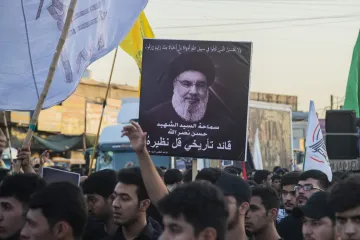'Will continue operation despite pager attacks, loss of commanders, loss of Nasrallah': Hezbollah's Dy Chief
Hezbollah's deputy leader vowed to continue fighting Israel and said the militant group was prepared for a long war after much of its top command was wiped out, including its leader, Hassan Nasrallah.

Beirut: The deputy chief of Lebanon's armed group Hezbollah is currently addressing the country for the first time since the killing of the group's secretary general in an Israeli air attack on Friday. During his address on Monday, Dy chief Naim Qaseem pledged to continue attacking Israel despite the losses that occurred in the past two weeks-- from pager explosions to the killing of Hezbollah's chief Sayyed Hassan Nasrallah in Lebanon.
"Group has lost a brother, a leader...', Qaseem said. "Will continue operation despite pager attacks, loss of commanders, loss of Nasrallah," he added.
Hezbollah has continued to fire rockets and missiles into northern Israel, but most have been intercepted or fallen in open areas. No Israelis have been killed since the latest wave of strikes on top Hezbollah leaders began on September 20.
In his first speech since Nasrallah was killed, Naim Kassem said in a televised statement Monday that if Israel decides to launch a ground offensive, Hezbollah fighters are ready to fight and defend Lebanon, where the group is based. As deputy secretary-general, Naim Kassem now is the acting leader of Hezbollah until the group's leadership elects a replacement for Nasrallah.
Top Hezbollah commanders killed
Israeli strikes have killed Nasrallah and six of his top commanders in the last 10 days, and have hit what the military says are thousands of militant targets across large parts of Lebanon. Over 1,000 people have been killed in Lebanon, nearly a quarter of them women and children, according to the Health Ministry, and the government says the fighting may have displaced up to a million people.
Hezbollah has significantly increased its rocket attacks in the past week to several hundred daily, but most have been intercepted or fallen in open areas. Several people have been wounded in Israel. There have been no fatalities since two soldiers were killed near the border on September 19.
Hezbollah vows to counter Israeli airstrikes
Kassem said that despite the killing of Hezbollah’s top military commanders over the past months, Hezbollah now is relying on new commanders. "Israel was not able to affect our (military) capabilities,” Kassem said. “There are deputy commanders and there are replacements in case a commander is wounded in any post.”
Before he spoke, an airstrike levelled an apartment building and killed three Palestinian militants in central Beirut early Monday, as Israel appeared to send a clear message that no part of Lebanon is out of bounds.
As recently as two weeks ago, such a strike, outside of the main areas where Hezbollah operates and next to a busy transportation hub, would have been seen as an escalation and likely followed by a long-range Hezbollah strike into Israel. But the unspoken rules of the long-running conflict, and Hezbollah's ability to respond, are no longer clear.
Israel has not claimed Monday’s strike but is widely assumed to have carried it out.
It's possible that Hezbollah is holding back to avoid an even bigger escalation, including a threatened Israeli ground invasion. But the militant group might also be in disarray after Israeli intelligence apparently penetrated its highest levels. The strike early Monday killed three members of the Popular Front for the Liberation of Palestine, a small, leftist faction that has not been meaningfully involved in months of fighting between Israel and Hezbollah.
Who is Qassem?
Here are some facts about Qassem.
- Qassem is a veteran figure in the group, having served as deputy secretary general since 1991.
- He was appointed deputy secretary general under Hezbollah's late secretary general, Abbas al-Musawi, who was killed by an Israeli helicopter attack in 1992, and remained in the role when Nasrallah became leader.
- His political activism began in the Lebanese Shi'ite Amal Movement, founded in 1974. He left Amal in 1979, in the wake of Iran's Islamic Revolution, which shaped the political thinking of many young Lebanese Shiite activists. He took part in meetings that led to the formation of Hezbollah, which was established by Iran's Revolutionary Guards in 1982.
- He has long been one of the leading spokesmen for Hezbollah, conducting many interviews with foreign media. As cross-border hostilities raged with Israel during the Gaza war, he told Al Jazeera in June that Hezbollah's decision was not to widen the war but that it would fight one if it was imposed on it.
- He has been the general coordinator of Hezbollah's parliamentary election campaigns since the group first contested them in 1992.
- He was born in 1953 in Beirut's Basta Tahta district and his family originally hail from Kfar Fila, in Lebanon's predominantly Shi'ite south. He is married with six children.
Epicentre: Beirut
In the past week, Israel has frequently targeted Beirut’s southern suburbs, where Hezbollah has a strong presence — including the massive strike on Friday that killed Nasrallah — but had not hit locations closer to the city centre. Hezbollah began firing rockets, drones and missiles into northern Israel after Hamas' Octover 7 attack from Gaza into Israel sparked the war there. Hezbollah and Hamas are allies and both supported by Iran, and Hezbollah said it would continue the attacks in solidarity with the Palestinians until there was a cease-fire in Gaza.
Israel has responded to the rockets with airstrikes in Lebanon, where Hezbollah is based, and the fighting has steadily escalated over the past year, displacing tens of thousands of people on both sides of the border. Israel has vowed to keep fighting until the attacks stop and its citizens can return to their homes.
(With inputs from agency)